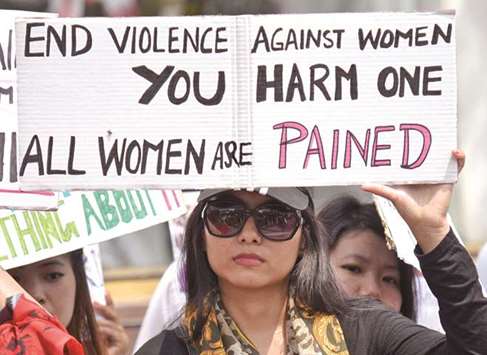The government yesterday approved the death penalty for child rapists, after the gang-rape and murder of an eight-year-old girl and a series of other horrific sexual assaults caused nationwide outrage.
Prime Minister Narendra Modi called a cabinet meeting to pass the measure yesterday on his return from the Commonwealth summit, officials said.
Protests have erupted across India in recent days over the rape and killing of the young girl by a group of men in Jammu and Kashmir, increasing pressure on Modi to take action.
The attack sent out the sort of shockwaves that shook the country after the equally horrific gang-rape of a Delhi student on a bus in 2012, which made headlines around the world.
The cabinet approved the ordinance amending laws on sexual violence to allow for capital punishment for those convicted of raping children below the age of 12, an official said.
Minimum jail sentences for convicted rapists were also toughened.
“The ordinance will be sent to the president for his consent,” the official said on condition of anonymity.
The president’s approval is seen as a formality.
The new decree requires trials involving child victims to be completed in two months after an arrest, unusually speedy for India where the wheels of justice turn slowly.
The order will remain in effect for a period of six months from the president’s approval, or until parliament votes the changes into law.
In recent months, four states have already introduced similar legislation in state assemblies to approve the death penalty for child rapists.
India has the death penalty for the most brutal murders and terror attacks.
But the sentences are rarely carried out and are often struck down on appeal by higher courts.
India carried out its last hanging in 2015 of a 1993 Mumbai bombing convict.
The recent protests began after police accused eight Hindu men of raping a Muslim girl in a bid to force her nomad community out of a Hindu-dominated area of Jammu.
Public anger boiled over after police last week made public how the girl was drugged, repeatedly raped while held captive for five days at a temple and then beaten to death.
India previously introduced tougher laws in 2013 after the brutal New Delhi gang-rape.
The incident triggered weeks of street protests and global condemnation.
But sexual violence, including against children, remains unabated in India, with some 11,000 child rape cases reported in 2015.
A 2014 UN report said one in three rape victims in India was a minor.
Yesterday, police in Madhya Pradesh arrested a man over the rape and murder of a four-month-old girl.
The infant’s blood soaked body was found on Friday in a building in Indore city hours after she went missing.
Police said the suspect was a distant relative of the victim and had targeted the child after an argument with her mother.
A sexual attack on an 11-year-old girl was also reported in Modi’s home state of Gujarat.
The postmortem revealed the girl had been tortured, raped, strangled and smothered.
Modi’s failure to speak out soon enough during the latest bout of public anger fuelled criticism that his government was not doing enough to protect women.
With a general election due next year, Modi moved swiftly to remedy that negative perception by holding the emergency cabinet meeting as soon as he returned yesterday morning.
Activists say lax implementation of laws and snail-paced trials fuel the “rape culture” in India, with many accusing police of being slack in cases involving influential people.
Modi’s government faced criticism after one his party members in Uttar Pradesh was accused by a teenager of raping her.
The Bharatiya Janata Party legislator remained free for almost a year after police rejected pleas from the victim to file a rape case against him.
He was finally arrested last week after the teenager tried to set herself on fire outside the residence of Chief Minister Yogi Adityanath, triggering a wave of protests.
DCW chief Maliwal to end fast today
Delhi Commission for Women chief Swati Maliwal, whose indefinite hunger strike to demand death for rapists of children continued for the ninth day yesterday, said she would end her fast at 2pm today. “I’m ending the fast, but the struggle will go on,” the Aam Aadmi Party leader said while announcing her decision. Earlier in the day, she said she would continue her fast till the time an ordinance on the death penalty for rapists of children below the age of 12 – which was approved by the cabinet yesterday – was not promulgated. Maliwal has been on fast since April 13 in support of her demand in the wake of rape and murder of an eight-year-old girl in Jammu and Kashmir’s Kathua in January and other similar sexual attacks elsewhere.
x

The government yesterday approved the death penalty for child rapists, after the gang-rape and murder of an eight-year-old girl and a series of other horrific sexual assaults caused nationwide outrage.
